Learning from Faith-Inspired Funders
Learning from Faith-Inspired Funders
By David P. King, Ph.D., Karen Lake Buttrey Director and Associate Professor, Philanthropic Studies
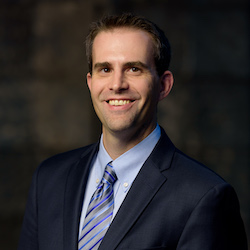
In studying faith and philanthropy, the first set of questions is often what counts as a faith-based organization. A close second, then, is how do we identify and categorize them. Among the thousands of these organizations across the philanthropic sector, is there a difference between faith-based, faith-inspired, or religiously identified organizations? And even if we can agree on how to count and categorize, the next set of questions are often asked in order to understand how faith-inspired organizations may be different or distinct from other “traditional” or “secular” philanthropic, nonprofit organizations.
Beyond a narrow focus on congregations, there are a number of approaches to categorizing the many other forms of faith-based organizations. Readers interested in going deeper might look to one approach that Thad Austin, me, and other IU colleagues developed to focus on both religious identity and activity of international humanitarian organizations. Another somewhat similar approach by Allison Ralph, Brad Fulton, and Samuel Allen classifies the particular field of faith-based public foundations. Mapping and scoping the institutional fields of faith and philanthropy is not easy nor uniform, but it is a fascinating area that Lake Institute’s research efforts will continue to explore.
That said, Insights readers also want to know what this actually means for the field of faith and giving and for their work in particular. Indeed, faith-inspired funders are not unique, and they do not operate completely independent from other philanthropic entities, but for those of us working in the philanthropic sector broadly, these faith-inspired organizations have a lot to teach us. In continuing to read below, I encourage you to consider the reflections of established philanthropic professional, Neill Coleman, in considering what secular philanthropy can learn from faith-inspired funders.
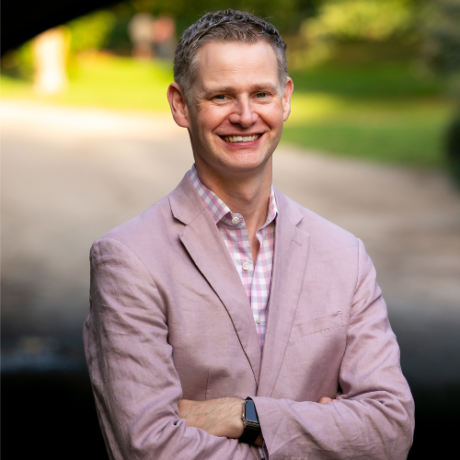
Secular Philanthropy Can Learn from Faith-Inspired Funders
By Neill Coleman, Founder & Principal, Mission Magnified Consulting
A particular group of funders are charting the way towards a more human-centered approach to philanthropy, and religious faith is their motivation and guide to doing so. While small in number, they have an important story to share–one that should be inspiring to secular foundations.
I have had the honor to work with several faith-inspired funders. I served as an executive director of Trinity Church Wall Street Philanthropies for five years. Most recently, through Mission Magnified Consulting, I worked with the Mother Cabrini Health Foundation and the Veatch Program at the Unitarian Universalist Congregation Shelter Rock. These engagements deepened my interest in this quite particular part of the philanthropy ecosystem: funders that are anchored in a religious congregation or denomination. There are many foundations whose establishment was inspired by the faith of their benefactors; others who fund religion as a program area; or those that support faith-inspired nonprofits. But the group of funders who exist within, or proximate to, a faith institution are smaller.
My sense of a distinctiveness to these faith-inspired funders inspired me to research further: to demystify them, explore where they are different from–or aligned with–secular philanthropy, and what all funders can learn from them. There is no single association or membership organization for these funders. I identified them mostly through connections and introductions, including from David P. King at Lake Institute on Faith & Giving. I was not able to cover as many faith traditions as I would have liked (most groups I spoke to are in the Christian tradition) but I hope I engaged with enough to get a sense of some common themes and approaches.
The Why
Every philanthropic entity has (or should have) a “why”–a mission or purpose that drives their creation and work. The faith-inspired funders I surveyed all expressed a strong connection to a set of faith-based values that drive their philanthropy–their “why.” One spoke of “philanthropy as a ministry” and “generosity” as a guiding principle.
As funders, the ability to make grants allows for an additional manifestation of the mission of their church or congregation. The resources to do this is a tool that few congregations have, and those that do acknowledge it as an unusual blessing or gift, which requires careful stewardship and discernment on how to use the funds. For these faith-inspired funders having a clear values frame is a way to deeply connect their philanthropy to their other work and ministries.
GLIDE in San Francisco is an operating foundation with programs addressing some of society’s most pressing issues and emerged from GLIDE Memorial Church. The church and the foundation recently became separate entities, but the stated core values of the church still guide the foundation. The GLIDE values are: Radically inclusive; truth-telling; loving and hopeful; for the people; celebration.
The What
For these faith-inspired funders the “why” really does inform the “what,” and human needs–both material and spiritual–tend to be at the forefront of informing and identifying focus areas for grant funding. Rev. Bethany Johnson-Javois, president and CEO of the Deaconess Foundation, says that they seek “to be strategic, but be strategic with a deeper analysis that includes spiritual discernment. Well-being of the soul is of central importance to our strategic approach…a priority that secular philanthropy is designed to leave out of the humankind equation. This is our differentiator.”
In addition to the identification of focus areas, these faith-inspired values also lead to a deeper concept of desired impact, beyond the more material solutions and metrics that many secular donors and foundations gravitate towards. While the number of tech internships, or units of affordable housing created may well be part of what success looks like, these funders are defining their impact in ways that also brings higher human purpose and meaning to the work.
Hope for New York, founded in 1992 by the late Rev. Tim Keller, supports nonprofits that provide basic needs for immigrants, the homeless and formerly incarcerated. Their CEO Elise Chong says, “Part of our mission statement is that we want to see flourishing across our city and flourishing for us means not only do we try to support the social or the economic side of communities and individuals, but we will also want to support the spiritual flourishing of individuals and communities.”
The How
Alongside informing what they fund, faith-based values also drive how these organizations engage as funders. They prioritize a relational and responsive approach to working with grantees, centering people and their humanity. Many of them also spoke about how they build spiritual practices for their own people–their staff–into their work as funders.
These faith-inspired funders prioritize a deeply relational approach to working with those they fund. Trinity Church Wall Street Philanthropies talk about “walking alongside” their grantees and invest in multiple capacity-building supports for grantees to make this real, including retreats, financial planning, and marketing and communications capacity.
Another way this commitment to a relational approach shows up is through longer-term funding than is usual in philanthropy. Hope for New York notes that they have been working with some grantees for thirty years or more. Mother Cabrini Health Foundation, the Veatch Program, and Christ Church Cathedral Indianapolis have recently made changes to their grant processes to make multi-year funding easier.
While many secular funders also practice long-term funding (and multi-year grants are increasingly seen as a philanthropic best-practice), a grounding in faith does seem to strengthen ongoing commitments and a relational model to the point where funding an organization for multiple decades is seen as a good thing. While some secular funders are still wary of creating “dependency,” a track-record of long-term engagement with grantees was a clear point of pride in conversations with several of these faith-inspired funders.
The human-centered relational approach is also demonstrated in a commitment to community participation. This dynamic can work both through bringing the community into the grants process, and through taking the faithful out to volunteer with grantee organizations.
You can read more about my findings in this article in the Lake Institute Resource Library. The biggest takeaway, and a key lesson these funders could share with their secular brethren, is the value of human connection. It informs the purpose, the values, the selection of grants, and the engagement with grantees. In doing so, these funders can shine a light for fellow funders on the importance of putting humanity back in philanthropy.
Neill Coleman is a leader in deploying philanthropy, partnerships, and persuasion to drive social change. As the Founder and Principal of Mission Magnified Consulting, he has a track-record of creating strategies, building organizations, and inspiring people towards meaningful impact. Neill served for five years as the Executive Director of Trinity Church Wall Street Philanthropies. Neill developed a strategic direction for an expansion of Trinity’s grant-making from $10 million to $57 million a year, focused on housing & homelessness and racial justice in New York City; and building leadership and financial capacity in the Anglican church globally. From 2012 to 2017 Neill was Vice President for Global Communications at The Rockefeller Foundation. During the first term of the Obama Administration Neill served as Chief External Affairs Officer at the US Department of Housing and Urban Development, He is a board member of Philanthropy New York. Neill is a native of Glasgow, Scotland, the son of a Presbyterian minister, and has a M.A. in Modern History from the University of Oxford.
Faith-based Capital Campaign: Your Blueprint to Readiness
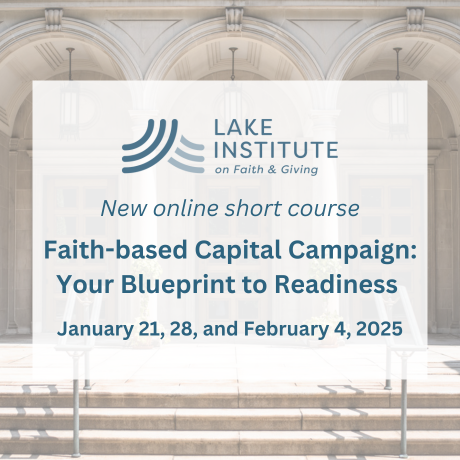 Lake Institute is proud of the two main courses we’ve offered over the past two decades: the Executive Certificate in Religious Fundraising and Cultivating Generous Congregations. Though there are still many faith communities and religious leaders who still seek out this training, we have a large group of alumni who desire further training with more specific topics. Earlier this year, our Associate Director of Education, Meredith McNabb, offered a short course on Developing Legacy Giving in Congregations which we will reprise again.
Lake Institute is proud of the two main courses we’ve offered over the past two decades: the Executive Certificate in Religious Fundraising and Cultivating Generous Congregations. Though there are still many faith communities and religious leaders who still seek out this training, we have a large group of alumni who desire further training with more specific topics. Earlier this year, our Associate Director of Education, Meredith McNabb, offered a short course on Developing Legacy Giving in Congregations which we will reprise again.
We are thrilled to invite you to join us this January and February, 2025, for “Faith-based Capital Campaign: Your Blueprint to Readiness,” a three-session intensive course led by Dr. Carlos Perkins, Associate Director of Engagement and Senior Pastor. This course is designed to help congregational leaders like you thoughtfully navigate the discernment process of launching a capital campaign, emphasizing spiritual readiness as the foundation for success. In our time together, you’ll explore how to set a realistic financial goal, determine whether to engage consultants, and ultimately craft a campaign aligned with the vision and values of your faith community.
This course is more than just technical guidance; it’s a journey into the deeper calling of generosity that a successful capital campaign can inspire within your congregation. Through live Zoom sessions and a rich array of online materials, we’ll equip you with the essential tools to engage both congregants and external stakeholders in creating a compelling case for support. Our sessions will explore the dynamics of fostering a generous spirit, one that not only meets immediate campaign goals but also enriches the spiritual life and mission of your congregation.
Whether your organization is contemplating its first campaign or preparing to take on a new challenge, “Your Blueprint to Readiness” offers insights and resources to discern the type of campaign that aligns with your unique goals and spiritual values. We hope you will join us on this path to readiness, where practical strategies and spiritual wisdom come together to empower your congregation’s growth in faith and generosity.
Join us to explore how to align your campaign with the mission of your organization and inspire meaningful giving.
Listen: Reimagining Giving Traditions with David P. King
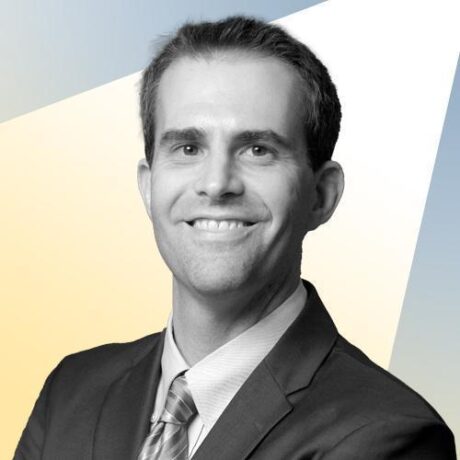
In this episode of the Leading and Thriving in the Church podcast, host Rev. Dr. Prince Rivers talks with David P. King of Lake Institute on Faith & Giving about reimagining giving traditions. As an American religious historian, King’s research interests broadly include exploring the practices of 20th- and 21st-century American and global faith communities as well as more specifically investigating how the religious identity of faith-based nonprofits shapes their motivations, rhetoric, and practice.
Upcoming Webinars: IU Lilly Family School of Philanthropy
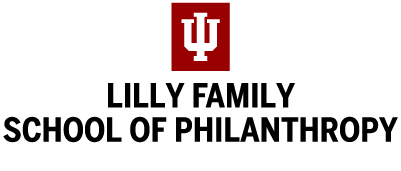 Mark your calendars for two insightful webinars hosted by the IU Lilly Family School of Philanthropy this December! These webinars offer unique perspectives from leading voices in the field—don’t miss out! Register today and be part of the conversation on shaping the future of philanthropy.
Mark your calendars for two insightful webinars hosted by the IU Lilly Family School of Philanthropy this December! These webinars offer unique perspectives from leading voices in the field—don’t miss out! Register today and be part of the conversation on shaping the future of philanthropy.
Higher Education and Philanthropy Webinar Series: Nikole Hannah-Jones
December 9, 1:00 p.m. – 2:00 p.m.
Join Susan King in a discussion featuring Nikole Hannah-Jones, the Pulitzer Prize-winning creator of the 1619 Project and a staff writer for The New York Times Magazine.
Public Policy and Philanthropy Series: Darren Walker
December 12, 1:30 p.m. – 2:30 p.m.
Join us on-line with Diane Kaplan, senior fellow at the school, who will moderate a discussion with Darren Walker, president of the Ford Foundation.
Subscribe
Insights is a bi-weekly e-newsletter for the religious community and fundraisers of faith-based organizations that provides:
- Reflections on important developments in the field of faith and giving
- Recommended books, studies and articles
- Upcoming Lake Institute events

